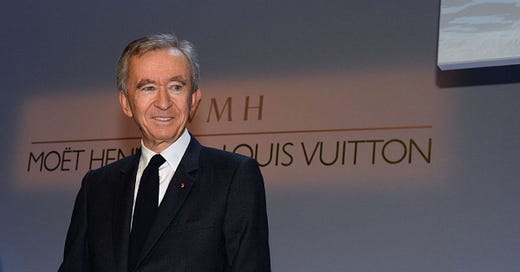The richest man in Europe and possibly the world is Bernard Arnaud. He is the driving force behind LVMH. The French luxury behemoth. Their brand portfolio is unparalleled - including Louis Vuitton, Moët Hennessy, Tiffanys and numerous others.
It's a powerful business model. A money making machine. Luxury brands are exclusive - not just because of their quality, but because of their special heritage. And LVMH drives demand by building on that heritage and creating further perceptions of exclusivity in the mind of the consumer.
Just open the Financial Times weekend colour supplement and the first three pages are often LVMH brands: Lionel Messi adorned in Louis Vuitton luggage. Alicia Vikander wearing their jewellery. Lewis Hamilton with his RIMOWA luggage.
The ROLEX company is also a masterful marketer: Look at the back of the The Economist magazine, and invariably there is an advertisement for a ROLEX watch - featuring a famous brand ambassador - like Roger Federer, or Tiger Woods.
This drives desire and creates pricing power. And, unlike most things, luxury products are what economists would term a Giffin good. Meaning that when you raise prices, demand actually goes up.
And it's not just LVMH and ROLEX. Ferrari, BREITLING, Zegna, Van Cleef & Arpels, Montblanc and many others doing it as well.
However, Charlie Munger points out an important downside to investing in luxury brands: These are companies that don't just create demand. The stoke envy. Enormous amounts of it. And they are really good at it.
But an envious society is not the best possible society. That's why we are commanded - in the 10 commandments - not to covet the possessions of our neighbours. Even though it's a huge part of human nature.
I've always thought of the business of luxury as being harmless to society. Certainly less harmless than tobacco or gambling. But if one takes Charlie Munger's point seriously, it's not entirely harmless. It frays the fabric of society.
Perhaps this is why Berkshire Hathaway seems to have never invested in these businesses. And perhaps this is also why Berkshire never took Borsheims in the same direction that Bernard Arnaud took Tiffanys.
If I want to own companies that build the civilization, Luxury might not be the place to be as an investor. Charlie Munger may not be with us any more. But with this clip - kindly shared by my friend Vitaliy, he has given me food for thought.
Curious to hear what you think?
PS. This article originally appeared as a post on LinkedIn




Hello Guy, I don’t think Charlie Munger would fully agree with this article—nor would Buffett. I say this because, in one of the last interviews Munger gave alongside Buffett, he mentioned that he loves Hermès, but not its price.
Moreover, Buffett has said on numerous occasions that he considers Apple to be a “luxury for fanatics.”
That said, I don’t view LVMH as a true competitor to Hermès.
I share similar thoughts with you Guy on this.
While I like two very luxury companies (Hermes and Ferrari), I have decided from a philosophical standpoint that we would not own any luxury businesses.
While there could be money to be made that we will miss out, it is okay and we can make it somewhere else.
It is most important to stay true to our philosophy of Vision Investing, owning companies that best reflect our best vision of the future, changing and shaping the world for the better.